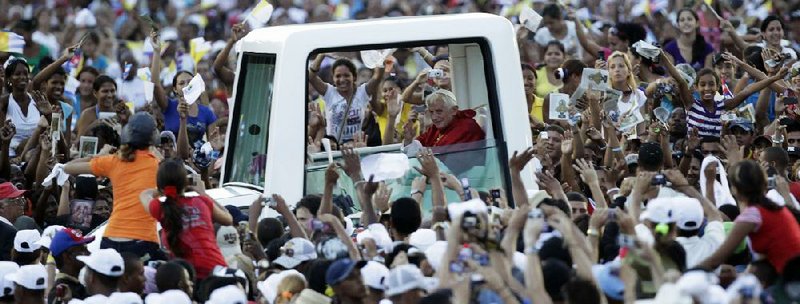HAVANA — Pope Benedict XVI stressed themes of freedom and change as he prayed before a powerful symbol of the Cuban nation ahead of a visit with the island’s president Tuesday. Communist leaders had a quick response: no to political change.
Benedict visited the shrine of the nation’s patron saint, the Virgin of Charity of Cobre, and spent moments in prayer before the wooden statue.
“I have entrusted to the Mother of God the future of your country, advancing along the ways of renewal and hope, for the greater good of all Cubans,” the pope said at the sanctuary in the little town of El Cobre, outside of Santiago.
“I have also prayed to the Virgin for the needs of those who suffer, of those who are deprived of freedom, those who are separated from their loved ones or who are undergoing times of difficulty.”
Marino Murillo, Cuba’s economic czar and a vice president on President Raul Castro’s council of ministers, soon made it clear that officials would not be responding with any political changes.
While the country is shaking up its economy, he told a room full of journalists who are covering the pope, “in Cuba there will not be political reform.”
At El Cobre, the pope pointedly referred to the Virgin by her popular name, La Mambisa, in a gesture to the many non-Catholics on the island who nonetheless venerate the statue as an Afro-Cuban deity. Mambisa is the word for the Cuban fighters who won independence from Spain at the turn of the last century.
The pope’s visit is timed for the 400th anniversary of the appearance of the statue of the Virgin to two fishermen and an African slave.
Dunia Felipillo, 45, said she was proud to see the pope praying before the Virgin of Charity, even though she herself is not Catholic.
“We all ask favors of la Cachita,” she said, using the Cuban slang for the Virgin, as she watched the ceremony on TV from the lobby of a Santiago hotel.
While most Cubans are nominally Catholic, fewer than 10 percent practice the faith.
“I appeal to you to reinvigorate your faith ... that you may strive to build a renewed and open society, a better society, one more worthy of humanity,” he said Monday at a Mass in Santiago.
Meanwhile, dissidents on the island were trying to determine the identity of a man who yelled “Down with the Revolution! Down with the dictatorship!” before the Mass. Security agents hustled him away. Video of the incident showed him being slapped by another man wearing the uniform of a first-aid worker, before security agents separated them.
“[We] have not been able to identify by name the young man who pronounced slogans in favor of freedom and against communism,” said a statement from Elizardo Sanchez, head of a group that monitors the detention of government opponents and is effectively a spokesman for the dissidents. “[We]call on the Cuban government to identify the person detained by the secret political police and inform on his whereabouts.”
The government did not comment.
Benedict walked with renewed vigor Tuesday as he greeted officials and clergy after his plane arrived inHavana after a day in eastern Cuba. He had appeared exhausted the previous evening from days of traveling in Mexico.
The pope was to meet with Raul Castro in the afternoon and possibly Fidel Castro, though that had not been confirmed.
Venezuelan President Hugo Chavez, who is in Havana for radiation therapy for cancer, did not ask for an audience but would be welcome to attend Mass in the capital’s Revolution Square today, a Vatican spokesman said.
In other developments, the Vatican canceled a stem-cell research conference whose speaker lineup included scientists whose work involves human embryonic stem cells, a practice the church opposes.
The Pontifical Academy for Life had organized the “Responsible Stem Cells Research Congress” for April 25-28 at the Vatican. But its website said that because so few participants had signed up, the event was canceled.
Information for this article was contributed by Paul Haven, Vivian Sequera, Anne-Marie Garcia, Nicole Winfield and Laura Wides-Munoz of The Associated Press.
Front Section, Pages 2 on 03/28/2012
